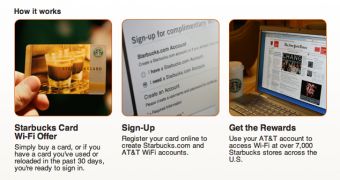Already jumped on the Starbucks Wi-Fi train, haven't you? Well, I wouldn't want to be the one bursting your bubble, but the coffeehouse chain has been sued by T-Mobile for violating a contract the two companies signed a while ago on a similar service. Whether the suit will have an impact on already-subscribed iPhone, iPod owners remains to be seen.
"As a way to thank our loyal customers, Starbucks is offering a reward for registering and using your Starbucks Card - complimentary access to AT&T Wi-Fi for up to two hours per day in any U.S. Starbucks store that offers Wi-Fi," the international coffeehouse chain informed fans on its website.
T-Mobile is now suing Starbucks for marketing its new Wi-Fi service with AT&T. In the lawsuit, the coffee giant is accused of breach of contract. Here's what happened:
Back in 2002, T-Mobile and Starbucks signed an exclusive deal to provide Wi-Fi in Starbucks coffeehouses. T-Mobile claims that, on the terms of their agreement, Starbucks was not supposed to advertise Wi-Fi services from AT&T in its stores, in any market, until all the stores switched from T-Mobile to AT&T.
As few as two Starbucks markets are currently using AT&T's Wi-Fi: Bakersfield, California, and San Antonio, Texas. So, while these are the only markets that have fully switched to AT&T so far, Starbucks has now started advertising its new Wi-Fi service through AT&T, NATIONWIDE. Given that T-Mobile is still sending wireless signals to Starbucks coffee shops, the company is currently "offering access to users of the new promotion without compensation," Macworld reveals.
It is clear that Starbucks saw no point in waiting for T-Mobile folks to sip their coffees, while everyone else would sip on Wi-Fi like water in the desert. The only problem Starbucks has is its contract with T-Mobile: why did it start advertising the service, knowing what it had signed back in 2002?
The answer is probably to be found within a reply from either of the companies in question. For the time being, none has answered questions related to the allegations made in this suit.

 14 DAY TRIAL //
14 DAY TRIAL //